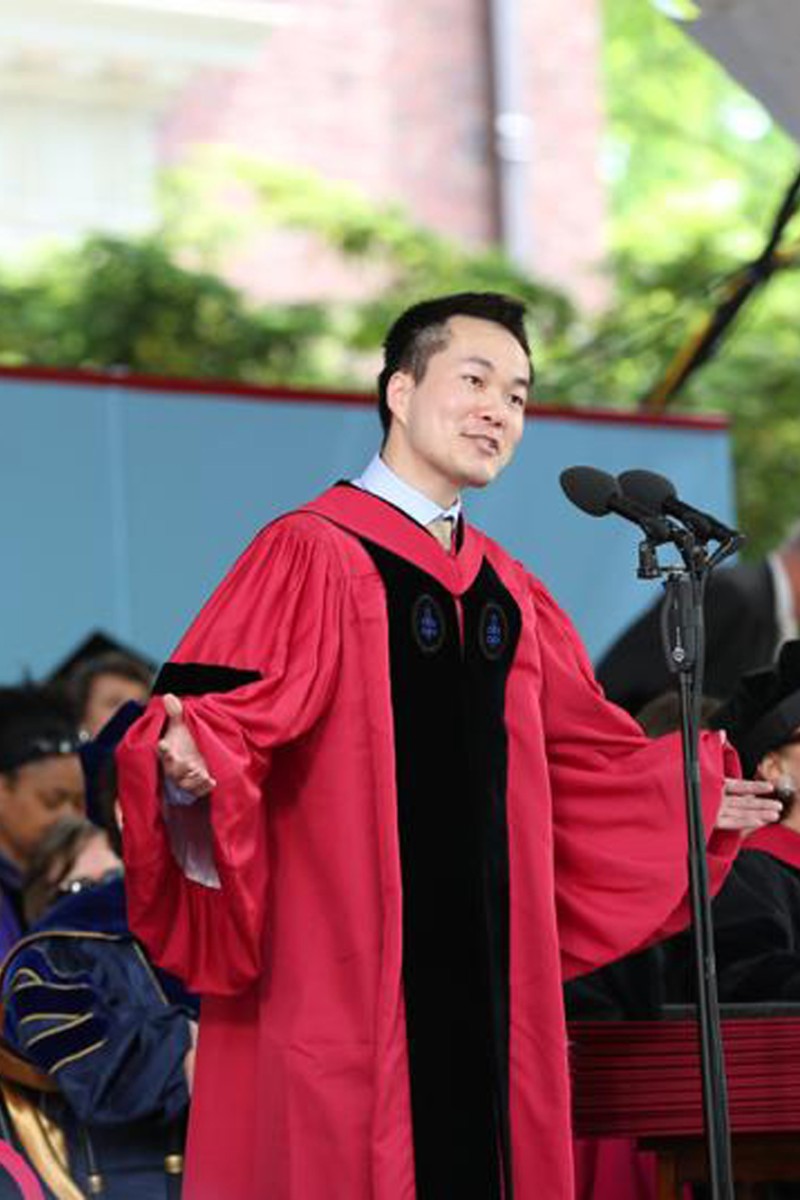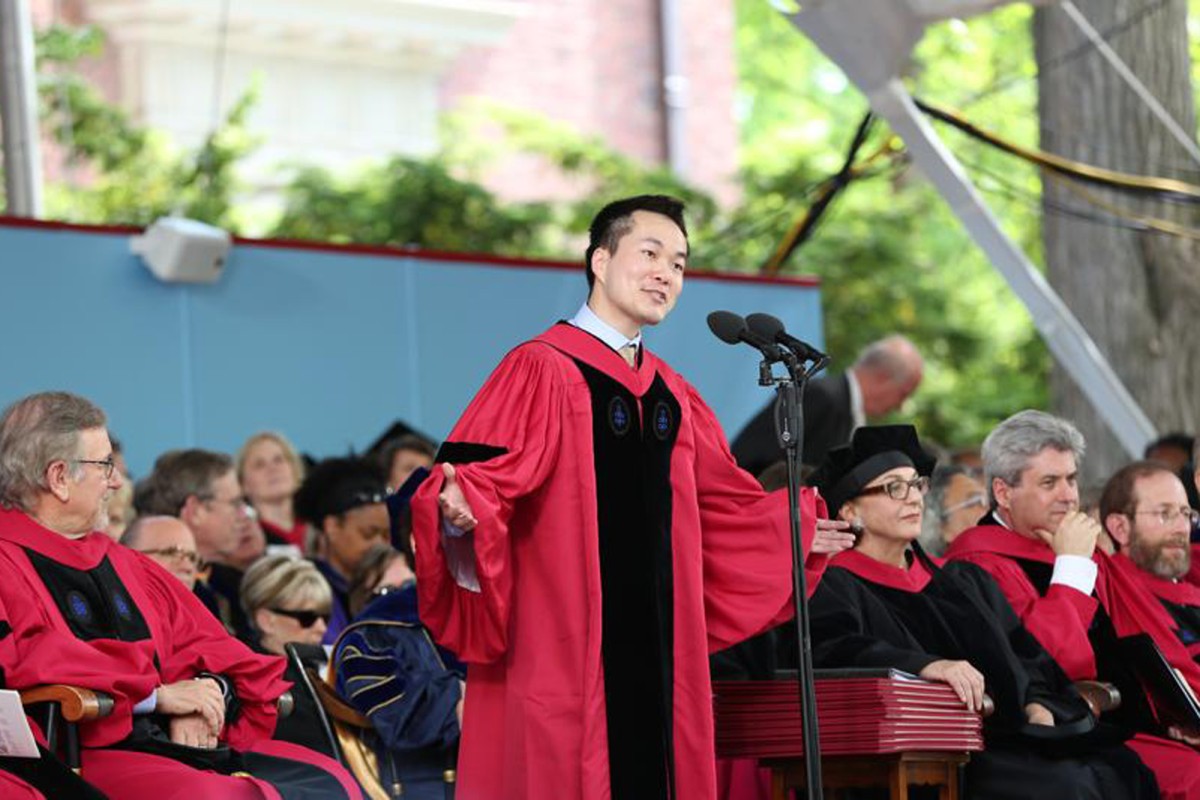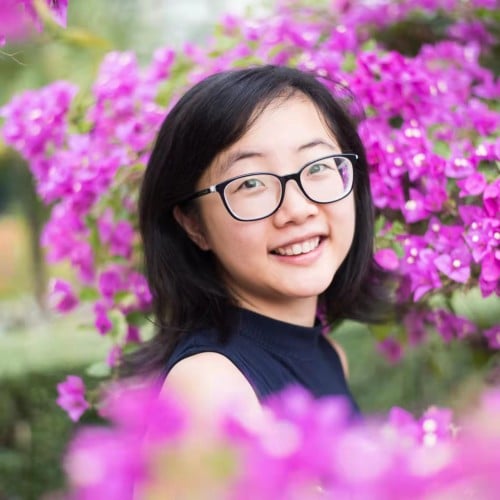
Harvard graduate He Jiang makes scientific research relevant to a rural village in Hunan
The first ever Chinese graduate to speak at Harvard’s commencement ceremony on handling culture shock, and how education changed his destiny
 He Jiang giving his commencement speech at Harvard on May 26, 2016.
He Jiang giving his commencement speech at Harvard on May 26, 2016.He was born and raised in a village, his primary school maths teacher was a part-time butcher, and he had never used a computer until he went to university, but He Jiang made it to the top. The 28-year-old recently walked the stage at Harvard as the first Chinese graduate to speak at the university’s commencement ceremony.
He was a long way from his traditional farming family in Hunan province on the mainland. Growing up in the village, He studied in poorly-built schools with shabby furniture. In a modern city like Hong Kong, biking is more often a sport and a hobby, but for teenage He, whose school was a two-hour walk from home, it was a necessity.
In his speech at Harvard on May 26, he described how his mother had set his hand on fire when he was bitten by a poisonous spider.
“You see, the part of China I grew up in was a rural village, and at that time, pre-industrial,” he said in the speech. “When I was born, my village had no cars, no telephones, no electricity, not even running water. And we certainly didn’t have access to modern medical resources. There was no doctor my mother could take me to see about my spider bite.”
When he first got to the US as a doctoral student in biochemistry, he was asked a lot about culture shock. He was certainly shocked, but it wasn’t the first time.
At 14, when he got into the best high school in the region, he had to board there, only seeing his family on weekends. Three years later, he moved even farther away, when he started at the University of Science and Technology of China in Hefei, the capital city of Anhui province.
Each time he moved, he’d meet new people who had completely different experiences growing up. He would have nothing in common with his new friends, which made even casual conversation difficult. “The TV shows we watched and the games we played were different,” He told Young Post. “I’ve encountered three culture shocks, but each time I got to a new environment, I’d force myself to learn new things and to blend in. It became a habit.”
That habit served him well in university, when He finally got a chance to use a computer – but first he had to figure out how to get Microsoft working. “I knew what a computer was and what it’s capable of, but no, I hadn’t used it before,” He recalled.
Though He now speaks fluent English, and makes cutting-edge breakthroughs on the other side of the globe, a piece of his heart will always belong to his home village.
He has finished writing a book on the journey his village took from pre-industrialisation to modernisation. The book will be titled The Village Where the Bell Stopped, a literal translation of Ting Zhong, the name of his village.
“China is not just Beijing, Shanghai, and other major cities,” He said. He hopes the book will show people, both at home and abroad, a vivid image of the village life and how it is changing.
He has always been a top student and was the first in his family to go to university, but he never knew how far he could go. “People in the village have no clue how big the world is," he says. Before graduating high school, he could only see himself going to university – the best ones in the country.
“Education has changed my destiny,” He said, “I wouldn’t have gone this far if not for the education I was given through the years.”
An equal distribution of knowledge, especially to where it’s needed the most, was a key message in He’s Harvard speech, which was based on his experiences of growing up in rural China, and in doing research in world-class labs.
He has worked on innovative research projects, but he started to question the value of it after realising that most people – including his family and close friends – couldn’t make sense of the findings.
“How could I bring the meaning of the research to the public, and how can more people benefit?” he asked himself.
These questions inspired He’s speech, and he then spent a month working on the script.
To become a speaker at the commencement speech, He had to go through three rounds of auditions. “Very intense,” he said, especially because He wasn’t confident in his English.
After closing the application at end of March, the university spent a month choosing the speakers and one month training them. “We had two professors and one coach who specialises in public speaking,” He said.
Fortunately He also had help from many friends and professors to work on delivering the key message:
“By using the science we already have, we could probably bring my village and thousands like it into the world you and I take for granted every day,” He said in his speech. “And that’s an impact every one of us can make.”
